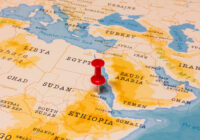Amid government policies that amount to slavery and crimes against humanity, Eritrean soccer players have sought asylum in Botswana.
Eritrea’s national soccer team has defected after ten of its players refused to return home following a World Cup qualifier in Botswana.
The defection and effective demise of the squad underscored the failure of autocratic rule in Eritrea, which has already been highlighted by the large contingent of Eritreans among the hundreds of thousands of refugees washing ashore in Europe. It also threw a spotlight on differing degrees of repression in failed autocracies and the way people deal with it. The defecting Eritrean players clearly felt they could afford to seek asylum without repercussions for family members left behind, a luxury Syrian soccer players do not enjoy.
In seeking asylum in Botswana, the players joined a long list of athletes who have left Eritrea against the backdrop of assertions by the United Nations (UN) that government policies amount to slavery and crimes against humanity and that torture is widespread.
The players reinforced the political statement embedded in their defection by appointing the exiled Eritrean Movement for Democracy and Human Rights (EMDHR) as their spokesperson.
Eritrean soccer (like Syrian football) has been leaking players, who are among the privileged few allowed to travel abroad, for years. As a result, the Eritrean team has had to rebuild from scratch several times.
Rebuilding the team is facilitated by the fact that Eritreans are enlisted for indefinite periods of time into national service. Eritrea has denied assertions in a UN report that it subjects its citizens to indefinite national service or kills people trying to flee the country.
While Eritreans have often defected in groups, Syrians have either left their country individually without turning their escape into a media event to protect relatives left behind, or in the cases of those players with dual nationality who lived abroad before the civil war began in 2011 quietly refused to play for what they saw as the team of President Bashar al-Assad rather than that of a nation that only still exists on paper.
The Eritrean defections are a blow to the government’s prestige in a country that, according to a 2009 US embassy cable disclosed by WikiLeaks, is “mad about soccer.” The cable noted that “senior government and party officials are avid fans of the British Premier League and sometimes leave official functions early to catch key matches.”
Twelve members of the national soccer team disappeared in Kenya in 2009 during a regional tournament. Another 13 players sought asylum in Tanzania in 2011. A year later, the reconstituted 17-member national team defected en masse together with their doctor while in Uganda. Four other Eritrean athletes requested political asylum in Britain after the 2012 London Olympics.
EMDHR Spokesman Dick Bayford, a Botswanan human rights lawyer, told reporters that the most recent defecting players were still doing national service and risked being charged with desertion, which is punishable by death if they were forced to return to Eritrea.
Pro-government media denied Bayford’s statement and asserted that the Eritrean team dispatched to Botswana had 34 members, 24 of which had returned to Eritrea.
Writing in Tesfanews, Mike Seium charged that the EMDHR “seem[s] to think that because 10 players defected the country is in uproar and we have serious problems. However, they don’t know Eritrea …The nucleus of the team is still there along with many other players. To those that defected, the sad part of it is that you are using the Eritrean national team to send a political agenda that allows failed organizations like the EMDHR to gain propaganda points.”
Eritrea vs Syria
While Eritrea ranks among the world’s most repressive nations, Syria hosts one of the world’s most vicious regimes, which explains why Syrian players choose to defect quietly.
As a result, Syria has largely been able—despite multiple defections—to keep its national team intact. Surprisingly, the team is performing well on the pitch, and even with the mayhem and bloodshed, it is closer to reaching the 2018 World Cup finals than it has ever been.
The stories of individual players nevertheless reflect Syria’s crisis. Mosab Balhous, the Syrian team’s goalkeeper, was arrested in 2011 on charges of supporting opposition movements and sheltering rebel fighters; he vanished for a year before suddenly re-joining the squad in 2012. The national youth team’s folk-singing goalkeeper Abdel Basset al-Saroot became a leader of the uprising in Homs before initially joining the Islamic State (IS), which he left in 2014 to join al-Qaeda’s Syrian affiliate, Jabhat al-Nusra.
Swedish-Assyrian international Louay Chanko opted out of the Syrian team because of what he called “corruption.” Striker Firas al-Khatib, who plays for Kuwait’s Al-Arabi SC, left the national team in 2012 because he did not want to represent the Assad government. The departure for Germany of youth team captain Mohammad Jaddoua prompted the Syrian Football Association (SFA) to ban players from traveling abroad except for on official business.
Other players have joined a team in Lebanon fielded by the US-backed Free Syrian Army that hopes to, one day, be Syria’s national team. It sports green jerseys, the color of the anti-Assad revolt, as opposed to the national squad’s red. The team’s coach, Walid al-Muhaidi, says he escaped Syria in 2013 together with some 100 athletes.
Syrian national team captain Abdulrazak al-Hussein told The Guardian ahead of a qualifying match earlier this month against Japan that his squad represented “all aspects of Syria. Whether you are a Christian or a Muslim or any sector of Islam we’re all one family, we’re playing for one team, one country.” His professed optimism put a brave face on a bad situation. “At the end of the day, we’re playing for the country, hoping it will get back to the way it was. The best thing we can do is unite the people of Syria,” he said.
Hussein’s optimism is all the more remarkable given that unlike Eritrea, which toils under repression but is not threatened by disintegration of its nation state, restoring Syria to its pre-2011 colonial borders is at best a distant dream. Few believe that Syria can be restored as a nation state within its pre-conflict borders. Russian intervention is widely seen as an effort to ensure that Assad controls a swath of land stretching from Damascus to Latakia on the Mediterranean coast that could constitute a rump state built around his Alawite minority—one of several entities that could emerge from the ruins of Syria.
Using options they have that are far less available to their Syrian counterparts, Eritrean players have with their repeated mass defections been doing what FIFA and other international sports associations should have long done: penalize regimes that blatantly violate human rights and use soccer to distract international attention and polish their badly tarnished images.
The views expressed in this article are the author’s own and do not necessarily reflect Fair Observer’s editorial policy.
Photo Credit: David Stanley
 We bring you perspectives from around the world. Help us to inform and educate. Your donation is tax-deductible. Join over 400 people to become a donor or you could choose to be a sponsor.
We bring you perspectives from around the world. Help us to inform and educate. Your donation is tax-deductible. Join over 400 people to become a donor or you could choose to be a sponsor.
Support Fair Observer
We rely on your support for our independence, diversity and quality.
For more than 10 years, Fair Observer has been free, fair and independent. No billionaire owns us, no advertisers control us. We are a reader-supported nonprofit. Unlike many other publications, we keep our content free for readers regardless of where they live or whether they can afford to pay. We have no paywalls and no ads.
In the post-truth era of fake news, echo chambers and filter bubbles, we publish a plurality of perspectives from around the world. Anyone can publish with us, but everyone goes through a rigorous editorial process. So, you get fact-checked, well-reasoned content instead of noise.
We publish 2,500+ voices from 90+ countries. We also conduct education and training programs
on subjects ranging from digital media and journalism to writing and critical thinking. This
doesn’t come cheap. Servers, editors, trainers and web developers cost
money.
Please consider supporting us on a regular basis as a recurring donor or a
sustaining member.
Will you support FO’s journalism?
We rely on your support for our independence, diversity and quality.






